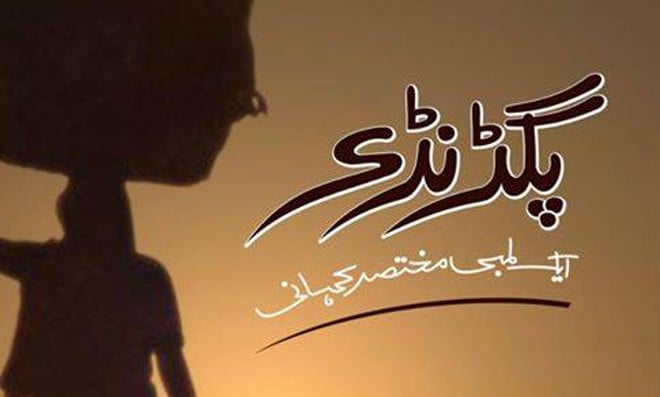

Adopting Virginia Woolf’s ‘stream of consciousness’ technique, Pagdandi -- A Long, Short Story stretches over the past several hundred years, where characters and environment are familiar yet exotic. It unfolds various dimensions of the society, covering the discourse on evolution, patriarchy, power structure, social change and religious militancy.
The story revolves around the life of a young and passionate boy, Sandal Khan who lived between 1970 and 2010 but uncovers many realities of ancient history and culture. Khan opens his eyes in a tribal Pashtun society that is about to fall apart. But people’s decisions could save it from total destruction.
Sandal Khan belongs to a well-off family of a village where all necessities of life are easily available and accessible. However, like Lord Buddha, since his childhood, he questions the injustices and inequalities prevailing around him. His thinking process, which he has inherited from his maternal grandfather, made him feel uncomfortable with everything around him. He was confused by the dynamics of power, prestige and honour when compared to suppression and domination. So, did the differences of class, race, caste and religion.
To escape the prevailing culture of silence in the society, Khan confines himself to reading books on Socrates, Lord Buddha, Karl Marx and Islamic literature.
He questions, if nature is full of diversity, why are humans unable to accept diversity? Even when as a middle-aged man, when his horizons are more widened, his questioning and challenging of anti-human acts practiced in the village continue to disturb him. Eventually, he is expelled from the village.
Throughout his life, Sandal Khan analyses the patriarchal structure of the society and the discourse of power associated with it. As a child, he observed the mechanised life of his mother, his aunts, and other women with resentment. The only woman that enjoys some privilege is his grandmother. But she is a product of the same patriarchal structure and perpetuates it completely.
While living in the village, Sandal Khan sees the strong roots of the patriarchal system, and later when he is banished from the village, he continues to be concerned about how women suppressed their desires and rights, and have to adapt to discriminatory social and cultural practices. For him, the real dilemma was that women perpetuate patriarchy, and in this process become "subjects" rather "objects".
Khan’s frustration is termed as "sin". He has to sacrifice his love, too, to the thirst of the tribal egos, and to the set structures of "right" and "wrong".
When he is banished from his village, he has the opportunity to meet different intellectuals whose thoughts and analysis, and life struggle show him a new way to look at rationality of survival and instincts, interpretation and misinterpretation of religion used as a tool in history to exploit others.
His mentor and role model, Sabawn Khan is not surprised by the increasing influence of militancy in the Pashtun belt. He has witnessed the discourse of militancy and extremism takeover the discourse of tolerance, universal love and pluralism. He always says that "the religion we are practicing did not befall on us all of a sudden, it has centuries old association. Does this mean that our forefathers were not good religious practitioners, as they did not adopt the codes we are supposed to adopt? This equally implies that all our forefathers were culprits and will be burning in hell".
Sandal Khan remains the most misunderstood man, till the whole society is forced to adopt an alien code of life. Even though his people isolate him, he is the one who leads the lashkars to defend his village against the militants.
The story does not have a happy ending. It ends with a whole family in the village burning to ashes inside a house. The story also uncovers many other harsh and brutal realities prevailing in the society that show visible degeneration of people in terms of their social, political, economic, and natural capital.